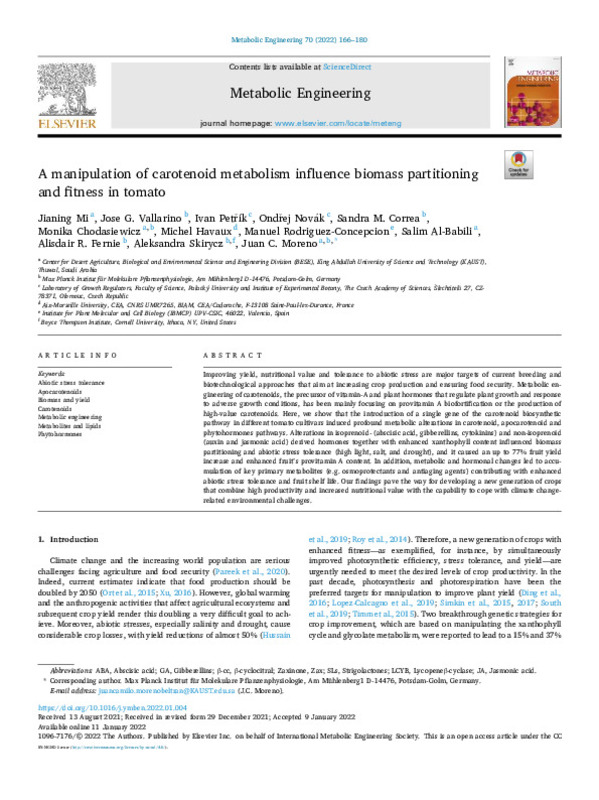JavaScript is disabled for your browser. Some features of this site may not work without it.
Buscar en RiuNet
Listar
Mi cuenta
Estadísticas
Ayuda RiuNet
Admin. UPV
A manipulation of carotenoid metabolism influences biomass partitioning and fitness in tomato
Mostrar el registro sencillo del ítem
Ficheros en el ítem
| dc.contributor.author | Mi, Jianing
|
es_ES |
| dc.contributor.author | Vallarino, Jose G.
|
es_ES |
| dc.contributor.author | Petrik, Ivan
|
es_ES |
| dc.contributor.author | Novak, Ondrej
|
es_ES |
| dc.contributor.author | Correa, Sandra M.
|
es_ES |
| dc.contributor.author | Chodasiewicz, Monika
|
es_ES |
| dc.contributor.author | Havaux, Michel
|
es_ES |
| dc.contributor.author | Rodríguez-Concepción, Manuel
|
es_ES |
| dc.contributor.author | Al-Babili, Salim
|
es_ES |
| dc.contributor.author | Fernie, Alisdair R.
|
es_ES |
| dc.contributor.author | Skirycz, Aleksandra
|
es_ES |
| dc.contributor.author | Moreno, Juan C.
|
es_ES |
| dc.date.accessioned | 2023-10-17T18:01:15Z | |
| dc.date.available | 2023-10-17T18:01:15Z | |
| dc.date.issued | 2022-03 | es_ES |
| dc.identifier.issn | 1096-7176 | es_ES |
| dc.identifier.uri | http://hdl.handle.net/10251/198244 | |
| dc.description.abstract | [EN] Improving yield, nutritional value and tolerance to abiotic stress are major targets of current breeding and biotechnological approaches that aim at increasing crop production and ensuring food security. Metabolic engineering of carotenoids, the precursor of vitamin-A and plant hormones that regulate plant growth and response to adverse growth conditions, has been mainly focusing on provitamin A biofortification or the production of high-value carotenoids. Here, we show that the introduction of a single gene of the carotenoid biosynthetic pathway in different tomato cultivars induced profound metabolic alterations in carotenoid, apocarotenoid and phytohormones pathways. Alterations in isoprenoid-(abscisic acid, gibberellins, cytokinins) and non-isoprenoid (auxin and jasmonic acid) derived hormones together with enhanced xanthophyll content influenced biomass partitioning and abiotic stress tolerance (high light, salt, and drought), and it caused an up to 77% fruit yield increase and enhanced fruit's provitamin A content. In addition, metabolic and hormonal changes led to accumulation of key primary metabolites (e.g. osmoprotectants and antiaging agents) contributing with enhanced abiotic stress tolerance and fruit shelf life. Our findings pave the way for developing a new generation of crops that combine high productivity and increased nutritional value with the capability to cope with climate change related environmental challenges. | es_ES |
| dc.description.sponsorship | We are grateful to Prof. Dr. Lothar Willmitzer for his support and advice. We thank Prof. Dr. Ralph Bock (Max Planck Institute of Molecular Plant physiology, Golm, Germany) and Dr. Caterina D'Ambrosio (Centro Ricerche Metapontum Agrobios, ALSIA, Italy) for kindly providing the transplastomic pNLyc#2 and LCe seeds and the homozygous nuclear High Caro (H.C.) lines, respectively. We thank Dr. Camila Caldana and Anne Michaelis for providing the GC facility and running the GC samples, respectively, and Maria Rosa Rodriguez-Goberna for technical support related with pigment analysis (supported by grant BIO2017-84041-P from the Spanish AEI). In addition, we thank Hana Martinkov ' a and Petra Amakorova for their help with phytohormone analyses. The hormonomics work was funded by the Ministry of Education, Youth and Sports of the Czech Republic (European Regional Development Fund-Project "Plants as a tool for sustainable global development" No. CZ.02.1.01/0.0/0.0/16_019/0000827), and the Internal Grant Agency of Palacky University (IGA_PrF_2021_011). | es_ES |
| dc.language | Inglés | es_ES |
| dc.publisher | Elsevier | es_ES |
| dc.relation.ispartof | Metabolic Engineering | es_ES |
| dc.rights | Reconocimiento - No comercial - Sin obra derivada (by-nc-nd) | es_ES |
| dc.subject | Abiotic stress tolerance | es_ES |
| dc.subject | Apocarotenoids | es_ES |
| dc.subject | Biomass and yield | es_ES |
| dc.subject | Carotenoids | es_ES |
| dc.subject | Metabolic engineering | es_ES |
| dc.subject | Metabolites and lipids | es_ES |
| dc.subject | Phytohormones | es_ES |
| dc.title | A manipulation of carotenoid metabolism influences biomass partitioning and fitness in tomato | es_ES |
| dc.type | Artículo | es_ES |
| dc.identifier.doi | 10.1016/j.ymben.2022.01.004 | es_ES |
| dc.relation.projectID | info:eu-repo/grantAgreement/MEYS//CZ.02.1.01%2F0.0%2F0.0%2F16_019%2F0000827/ | es_ES |
| dc.relation.projectID | info:eu-repo/grantAgreement/AEI/Plan Estatal de Investigación Científica y Técnica y de Innovación 2013-2016/BIO2017-84041-P/ES/NUEVAS HERRAMIENTAS BIOTECNOLOGICAS PARA MEJORAR LA PRODUCCION Y EL ALMACENAJE DE VITAMINAS A Y E EN CELULAS VEGETALES/ | es_ES |
| dc.relation.projectID | info:eu-repo/grantAgreement/Palacký University Olomouc//IGA_PrF_2021_011/ | es_ES |
| dc.rights.accessRights | Abierto | es_ES |
| dc.contributor.affiliation | Universitat Politècnica de València. Instituto Universitario Mixto de Biología Molecular y Celular de Plantas - Institut Universitari Mixt de Biologia Molecular i Cel·lular de Plantes | es_ES |
| dc.description.bibliographicCitation | Mi, J.; Vallarino, JG.; Petrik, I.; Novak, O.; Correa, SM.; Chodasiewicz, M.; Havaux, M.... (2022). A manipulation of carotenoid metabolism influences biomass partitioning and fitness in tomato. Metabolic Engineering. 70:166-180. https://doi.org/10.1016/j.ymben.2022.01.004 | es_ES |
| dc.description.accrualMethod | S | es_ES |
| dc.relation.publisherversion | https://doi.org/10.1016/j.ymben.2022.01.004 | es_ES |
| dc.description.upvformatpinicio | 166 | es_ES |
| dc.description.upvformatpfin | 180 | es_ES |
| dc.type.version | info:eu-repo/semantics/publishedVersion | es_ES |
| dc.description.volume | 70 | es_ES |
| dc.identifier.pmid | 35031492 | es_ES |
| dc.relation.pasarela | S\487334 | es_ES |
| dc.contributor.funder | Palacký University Olomouc | es_ES |
| dc.contributor.funder | Agencia Estatal de Investigación | es_ES |
| dc.contributor.funder | European Regional Development Fund | es_ES |








